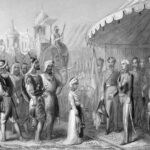 Getty Images/iStockphoto
Getty Images/iStockphotoWhen we picture the wealthy elite of ancient Rome, we tend to imagine senators, landowners, or military leaders living in marble villas with servants and sprawling estates. And yes, those roles certainly brought power and money. But they weren’t the only paths to wealth. Ancient Rome had its fair share of professions that, while unglamorous or unexpected, could make you astonishingly rich. In some cases, these jobs carried little social respect, but brought in serious coin. Here are some surprising ways people made a fortune in ancient Rome.
Urine collectors
It might sound bizarre, but collecting urine was actually a legitimate business. Urine was used as a key ingredient in fulling, the process of cleaning and whitening woollen cloth. It contains ammonia, which made it effective for breaking down grease and stains.
Collectors gathered urine from public latrines and sold it to fullers and tanners. It was so valuable that Emperor Vespasian imposed a tax on it in the 1st century CE. In fact, the phrase “Money doesn’t stink” (“pecunia non olet”) comes from Vespasian’s response to critics of the tax. For those willing to get their hands dirty, urine collection was surprisingly lucrative.
Funeral contractors
Death was big business in Rome. With a strong emphasis on ritual, status, and public display, funerals—especially for the upper classes—were elaborate affairs. Professional undertakers, or libitinarii, handled everything from organising the procession to hiring mourners, musicians, and actors to dramatise the life of the deceased.
If you could establish a reputation as a reliable and efficient funeral organiser, particularly among Rome’s elite, you stood to make a tidy profit. And because death wasn’t seasonal or dependent on fashion, demand for their services was constant.
Bakers and millers
Grain was the backbone of the Roman diet, and bread was a staple for nearly everyone. That meant there was always a need for millers to grind the grain and bakers to supply the bread. At first glance, these might seem like humble professions, but a successful baker could become very wealthy.
In fact, the tomb of Eurysaces the Baker—still visible today in Rome—is one of the most impressive monuments ever built by a freedman. He made his fortune in baking and proudly displayed it. High demand and the potential for state contracts meant a good baker didn’t just make dough—they made serious money.
Gladiator trainers
While gladiators themselves lived short and brutal lives, the men who owned and trained them—lanistae—could earn vast sums. A well-run gladiator school was expensive to operate but could produce fighters that drew huge crowds and brought in large profits from sponsorships, betting, and appearances.
Elite gladiators were like celebrities, and a lanista with a stable of star fighters had influence, fame, and wealth. Though the job wasn’t exactly considered honourable (many Romans looked down on lanistae), that didn’t stop it from being profitable.
Water and engineering contractors
The Romans were famous for their engineering, and large-scale public works projects—like aqueducts, baths, and roads—required skilled professionals. Contractors who took on these jobs, often former soldiers or freedmen, could become incredibly wealthy.
These projects were funded by the state and often backed by powerful patrons. Success in these ventures could lead to further contracts, prestige, and even political favour. Engineers and builders might not have held the same status as senators, but their wealth was very real.
Tavern owners
While taverns (tabernae) were sometimes seen as shady or low-status places, running a successful one—particularly near a forum, theatre, or military garrison—could be a cash cow. Wine, snacks, and entertainment brought in regular customers, and savvy owners often expanded into inns, gambling, or brothels.
In busy cities or along trade routes, taverns were central hubs of social and economic activity. If you could manage the crowds and deal with the occasional brawl, you could make a good living—especially if you catered to soldiers or the travelling elite.
Slave traders
It’s one of the more uncomfortable realities of Roman society, but the buying and selling of human beings was not only legal—it was a booming industry. Slave traders operated across the empire, sourcing people from conquered territories and selling them to households, farms, mines, and gladiator schools.
A successful trader could become very wealthy, particularly if they specialised in skilled slaves—teachers, musicians, or doctors. While it’s a grim part of history, it’s undeniable that many fortunes were built on this trade.
Actors and entertainers (occasionally)
Actors in Rome didn’t usually enjoy high status, but a few broke through to become wealthy and influential. Mime and pantomime were especially popular forms of entertainment, and successful performers could earn large fees, gifts from patrons, and public adoration. Female performers and dancers sometimes attracted powerful admirers and ended up in the circles of the rich and powerful. While the path wasn’t guaranteed, a few managed to go from stage to riches.
Professional gamblers
Gambling was technically illegal in many contexts, but that didn’t stop anyone. Dice games, board games, and betting on races and gladiatorial fights were rampant. Professional gamblers—those who knew the odds, the players, or how to cheat—could make a good deal of money. Of course, the risks were high. But in a society obsessed with luck and fate, skilled gamblers found ways to profit. Some even used their winnings to buy property or fund businesses.
Moneylenders and bankers
Banking wasn’t regulated in the modern sense, but lending money at interest was a key part of Roman commerce. Argentarii (bankers) and other financiers facilitated loans, managed estates, and profited from interest payments.
Moneylenders who chose their clients carefully and kept detailed records could make enormous profits. Some worked with the elite, while others served traders and merchants. The wealthiest could amass fortunes rivaling the senatorial class.
Ancient Rome was full of surprises when it came to wealth.
While political office and landowning were the obvious ways to riches, plenty of Romans found fortune through unexpected, and sometimes unsavoury, professions. Whether collecting urine or running a tavern, success often came down to timing, skill, and a willingness to operate in the shadows of more respected society. And just like today, those who could spot an opportunity—and work it—often ended up far richer than anyone expected.



